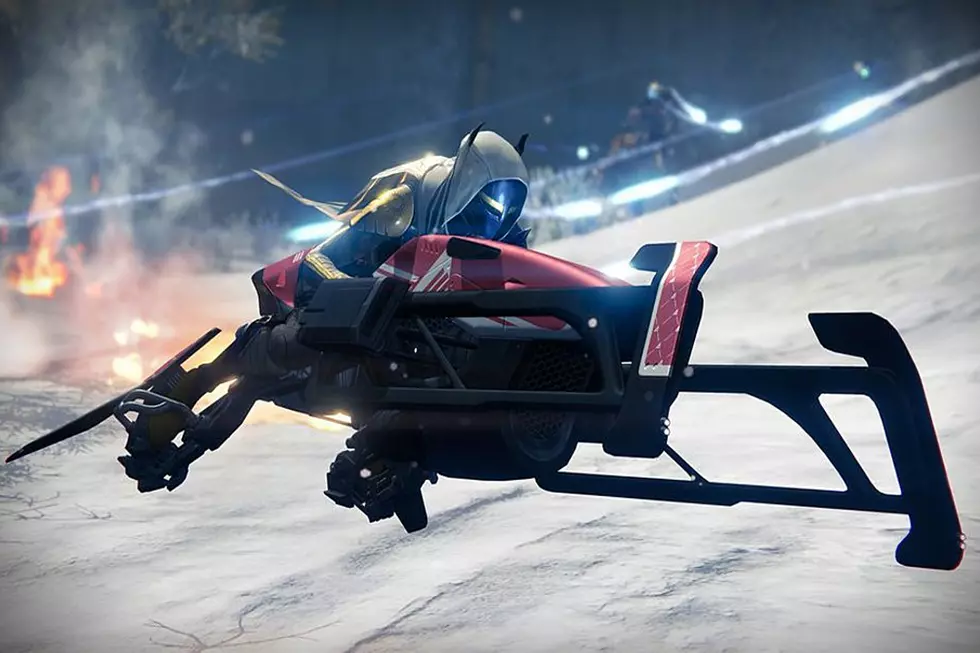
Destiny is an Online Experience All its Own
Destiny is a very divisive game. Some say it's one of the best shooters they've played, others criticize the lack of content and lackluster story. Whatever side of the argument you happen to be on, one thing has become abundantly clear: Destiny is not an MMORPG. Call it a shared world shooter or make all of the Borderlands comparisons you want, but bundling it with all of the current MMOs does Destiny a disservice. Destiny doesn't fit into conventional labels, and perhaps it shouldn't.
What makes a game an MMORPG? By definition, an MMORPG is an online role-playing video game in which a large number of people participate in at the same time. Destiny fits this definition, however there is much less emphasis on finding new people in social areas or making friends with in-game chat, as well as the role-playing. In Destiny you'll meet tons of other Guardians both in and out of the Tower, the game's only social area, but your interactions will be much more utilitarian and much less recreational. Matchmaking in Strikes will have you pushing back the Darkness with players you've never met before, and will probably never see again.
This might seem like a detriment to the connective nature of an online game, but in Destiny, it means players who wish to enjoy the game on their own terms can, and have just as much fun with strangers as a Fireteam of three close friends. There are times, such as the weekly Nightfall strikes and raids where having a group of friends is essential. For those instances Bungie has recently introduced "Fireteam chat" in all areas of the game, so players with a headset can find other Guardians seeking the same things. The key element here is that with the exception of raids, all content in the game can be completed solo. Some prefer to go at it with a team, but the lone wolf playstyle can arguably add to the atmosphere of desolation and lawlessness.
The biggest difference, and the first thing brought up when arguing against Destiny as an MMORPG is its gameplay. Destiny is a first-person shooter. Like most other first-person shooters, Destiny puts mechanics and gunplay above all else. Level design, open environments and enemy design are on a similar level of importance, but the focus here is on solid gunplay. In that regard, Destiny is in a league of its own. It has some of the best shooting mechanics of any console shooter, and it’s part of what makes the game so fun and addictive. It’s one of few instances where even die hard FPS fans who swear by auto rifles find themselves falling in love with hand cannons and shotguns, just because they’re so much fun to use.
Additionally, Destiny encourages player customization in a different way than MMORPGs or other shooters. The surprisingly deep RPG elements bolster what some say are entirely too similar character classes. There are no class-specific weapons, only class-specific armor, but all armor contributes to one (or more) of three stats: Strength, Discipline, and Intellect. These all affect the cooldown of your melee, grenade, and super abilities, respectively. This ends up letting the player customize any of the classes to perfectly suit his playstyle, even if Warlocks aren’t a speed class and Hunters aren’t tanks, you can successfully play them that way if you please. This puts more control in the players hands than traditionally restricting RPG classes, but also adds the burden of having to collect the proper loot for those classes. That can be awful tiresome thanks to Destiny’s heavy reliance on random number generation (RNG) for its loot system. It’s not all bad though, since a lot of useful gear and weapons can be bought from vendors.
All of this may paint Destiny as an MMORPG, but it just uses the same basic colors as one. The framework of an MMORPG is there; multiple vendors and currencies, factions, and RNG based loot system, and whole lot of customization. However the way these are implemented into the FPS genre, and not the other way around are what make Destiny unique. A Warlock is a Warlock not because of magical powers or spells, but because of the mystical and supportive nature of its abilities and class perks. The Hunter’s abilities makes the class great gunslingers and versatile teammates, but all of these things are tailored for a first-person shooter, rather than copy-pasted abilities from an RPG.
These all enhance the game’s strongest point, the gameplay. Running a strike on a Fireteam that includes all three classes really shows off the differences in each. Hunters zip around the battlefield quickly dispatching lesser enemies, while Titans set up a defensive bubble to provide cover and Warlocks create chokepoints with a flurry of well-placed grenades. This level of strategy makes Destiny an enhanced FPS experience, not an MMORPG experience where guns are simply a gimmick used to make it seem unique.
Destiny lets the player decide what to call the experience, whether they want to play the same way they’ve played MMOs in the past, or transpose their FPS experience in a new arena. Destiny welcomes both playstyles with open arms, and in this game they are allowed to intermingle and coexist in harmony. Veterans of both genres can learn a lot from each other if they choose to form those connections, or discover a new way to play on their own.
Destiny can be criticized a million ways for its flaws, but what remains true is the absolutely incomparable online experience it provides--one that we’ve seen hinted at in other games, but never realized like this. Call it a shared-world shooter, an FPS RPG, a way to hang out with friends--whatever you want, just don’t call it an MMORPG.
More From Arcade Sushi
![Destiny 2 Strike Hands-On: Digging Into The Inverted Spire [Preview]](http://townsquare.media/site/550/files/2017/05/destiny-2-strike.jpg?w=980&q=75)
![Destiny 2 Campaign Hands-On: The Cabal Crash Homecoming [Preview]](http://townsquare.media/site/550/files/2017/05/density-2.jpg?w=980&q=75)







